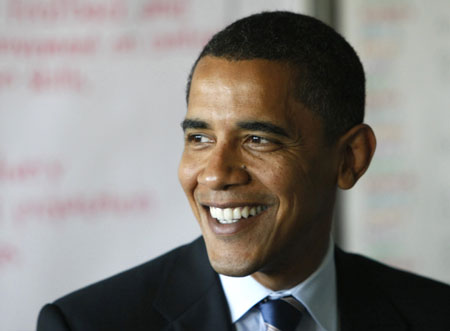Obama campaign used party rules to foil Clinton
(Agencies)
Updated: 2008-05-30 19:06
Updated: 2008-05-30 19:06
WASHINGTON - Unlike Hillary Rodham Clinton, rival Barack Obama planned for the long haul. Clinton hinged her whole campaign on an early knockout blow on Super Tuesday, while Obama's staff researched congressional districts in states with primaries that were months away. What they found were opportunities to win delegates, even in states they would eventually lose.
 US Democratic presidential candidate and US Senator Barack Obama (D-IL) comments on a student presentation at the Mapleton Expeditionary School of the Arts in Thornton, Colorado May 28, 2008. [Agencies] |
Obama's campaign mastered some of the most arcane rules in politics, and then used them to foil a front-runner who seemed to have every advantage - money, fame and a husband who had essentially run the Democratic Party for eight years as president.
"Without a doubt, their understanding of the nominating process was one of the keys to their success," said Tad Devine, a Democratic strategist not aligned with either candidate. "They understood the nuances of it and approached it at a strategic level that the Clinton campaign did not."
Careful planning is one reason why Obama is emerging as the nominee as the Democratic Party prepares for its final three primaries, Puerto Rico on Sunday and Montana and South Dakota on Tuesday. Attributing his success only to soaring speeches and prodigious fundraising ignores a critical part of contest.
Obama used the Democrats' system of awarding delegates to limit his losses in states won by Clinton while maximizing gains in states he carried. Clinton, meanwhile, conserved her resources by essentially conceding states that favored Obama, including many states that held caucuses instead of primaries.
In a stark example, Obama's victory in Kansas wiped out the gains made by Clinton for winning New Jersey, even though New Jersey had three times as many delegates at stake. Obama did it by winning big in Kansas while keeping the vote relatively close in New Jersey.
The research effort was headed by Jeffrey Berman, Obama's press-shy national director of delegate operations. Berman, who also tracked delegates in former Rep. Dick Gephardt's presidential bids, spent the better part of 2007 analyzing delegate opportunities for Obama.
Obama won a majority of the 23 Super Tuesday contests on Feb. 5 and then spent the following two weeks racking up 11 straight victories, building an insurmountable lead among delegates won in primaries and caucuses.
What made it especially hard for Clinton to catch up was that Obama understood and took advantage of a nominating system that emerged from the 1970s and '80s, when the party struggled to find a balance between party insiders and its rank-and-file voters.
Until the 1970s, the nominating process was controlled by party leaders, with ordinary citizens having little say. There were primaries and caucuses, but the delegates were often chosen behind closed doors, sometimes a full year before the national convention. That culminated in a 1968 national convention that didn't reflect the diversity of the party - racially or ideologically.
The fiasco of the 1968 convention in Chicago, where police battled anti-war protesters in the streets, led to calls for a more inclusive process.
One big change was awarding delegates proportionally, meaning you can finish second or third in a primary and still win delegates to the party's national convention. As long candidates get at least 15 percent of the vote, they are eligible for delegates.
|
||
|
||
|
|
|
|

